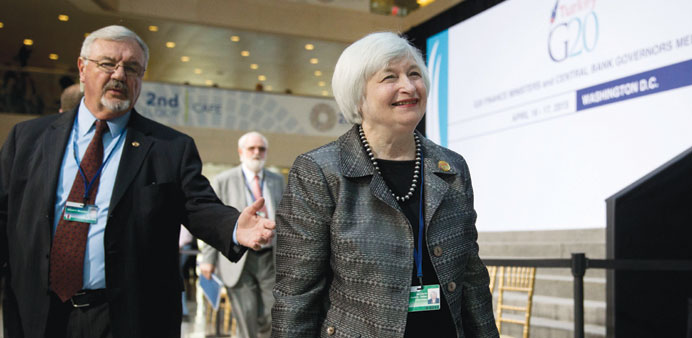Janet Yellen, chair of the US Federal Reserve, arrives to the G20 finance ministers’ and central bank governors’ meeting on the sidelines of the International Monetary Fund (IMF) and World Bank Group Spring Meetings in Washington yesterday. In a draft of a communique, the ministers and bankers welcomed brighter economic signs in rich economies, but lamented over weakness in some emerging nations.
Reuters/Washington
The Group of 20 leading economies struck a hopeful tone on the outlook for global growth yesterday even as officials fretted that Athen’s inability to strike a deal with its lenders could upset Europe’s tentative recovery.
In a draft of a communique to be released later in the day, G20 finance ministers and central bankers welcomed brighter economic signs in rich economies, but lamented over weakness in some emerging nations.
“Risks to the global economy are more balanced since we last met,” the draft said. “Prospects in advanced economies, notably the euro area and Japan, have improved and this could support a stronger global recovery.”
Still, the group of developed and emerging market nations, which represent around 80% of global economic output, warned of risks. “There are challenges, including volatility in exchange rates and prolonged low inflation along with negative interest rates, sustained imbalances and geopolitical tensions,” it said.
While Greece was not mentioned by name in the communique, it was clearly on the minds of top officials in Washington for the G20 gathering, and the spring meetings of the International Monetary Fund and World Bank.
“The mood is notably more gloomy than at the last international gathering,” British finance minister George Osborne told reporters, adding that discussions on Greece “pervaded” every meeting. “It’s clear now to me that a misstep or a miscalculation on either side could easily return European economies to the kind of perilous situation we saw three to four years ago.”
Athens has been trying to strike a deal with its IMF and EU creditors to ease the bailout terms the lenders imposed. Until a deal is struck, bailout cash is on hold.
Progress in the talks, however, has been painfully slow and Greece could run out of money ahead of debt repayments next month.
“It’s important that we in the coming days make significant progress, that the process gains momentum,” IMF European Department Director Poul Thomsen told reporters.
“There needs to be a comprehensive package and that will clearly take several weeks or more of discussions,” he said.
Concerns about Greece contributed to stock price declines in Europe and on Wall Street.
The G20, however, sounded guardedly optimistic the global economy was poised for at least a modest recovery.
But it pointed to a heightened risk of financial volatility as the monetary policies of major central banks begin to go their separate ways.
“In an environment of diverging monetary policy settings and rising financial market volatility, policy settings should be carefully calibrated and clearly communicated to minimize negative spillovers,” the draft communique said.
“We will continue to monitor financial market volatility and take necessary actions.”
The language was evidence of concern over potential disruptions as the US Federal Reserve moves toward a rate hike, even as the European Central Bank and Bank of Japan keep the monetary spigots wide open.
The main worry centres on emerging markets, which have been beset by capital outflows as investors placed bets on higher interest rates in the US.
“Those who managed themselves well will probably not suffer very much and those who went totally into short term may well suffer for some while while they adjust,” Fed vice-chairman Stanley Fischer said on Thursday. “We all know the famous Warren Buffet line, that when the water goes out you discover who’s been swimming naked.”
Meanwhile, US President Barack Obama yesterday said Greece must undertake reforms to bring stability to its shaky financial system, adding that Washington is open to flexible policies that nudge the European nation’s economy toward recovery.
“Greece needs to initiate reforms,” Obama said at a joint press conference with Italian Prime Minister Matteo Renzi at the White House.
“They have to collect taxes. They have to reduce their bureaucracy, (institute) more flexible labor practices,” Obama added.
Obama, recalling a phone call with Greece’s incoming prime minister Alexis Tsipras earlier this year, said his administration “will be supportive of some flexibilities in how you move forward so that you can make investments.”
“And it’s not just squeezing blood from a stone, but you have to show those who are extending credit and supporting your financial system (that) you’re trying to help yourself.” Page 9

